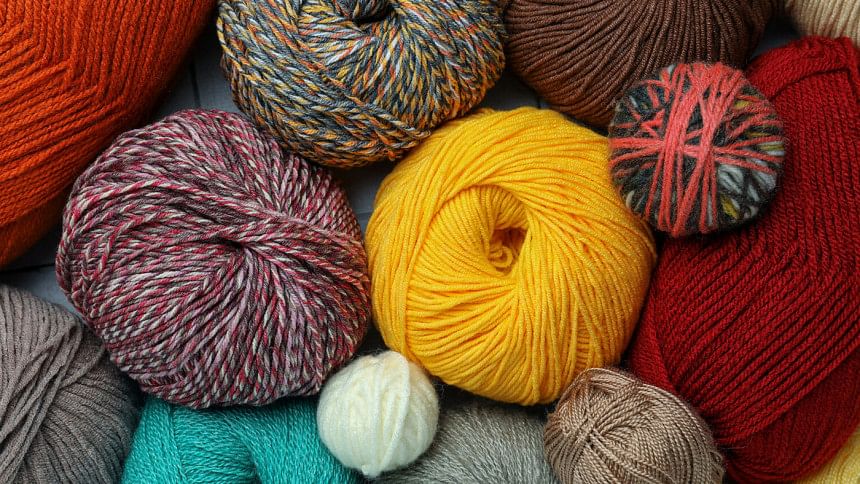Focus on making apparel by recycling yarn, fabric

Local garment suppliers will have to focus on making apparels wholly from recycled materials by 2030 as the H&M is going to abide by a European Union (EU) due diligence law on protecting the environment and human rights.
As a part of the new rules, the H&M has a target to have 24 per cent of its apparels sourced from recycled or sustainable materials by 2025, said Ziaur Rahman, regional country manager of the Swedish retail giant in Dhaka.
The recycled materials are yarn and fabric made from old and discarded clothing or scrap of garment manufacturing processes, widely known as "jhoot" in Bangla.
No virgin cotton will not be used in the apparels and the only exception will be fibres from cotton grown from sustainable cultivation practices, Rahman told The Daily Star over the phone.
Through recycled materials, clothing items get a second life, he said.
Under the EU's due diligence act, the international clothing retailers and brands will have to use the recycled yarn and fabrics for garment items meant for the EU markets, he said.
The H&M started sourcing garment items made from the recycled materials a lot earlier as a part of the retail giant's preparations to do business under the EU's due diligence act in the near future.
The circular economy tackles climate change and other global challenges like biodiversity loss, waste and pollution, by decoupling economic activity from the consumption of finite resources, the H&M said.
"In our current economy, we take materials from the Earth, make products from them, and eventually throw them away as waste – the process is linear. In a circular economy, by contrast, we stop waste being produced in the first place," the H&M said.
Currently, since the local spinners and weavers cannot supply the required quantity of recycled materials like yarn and fabrics, the demand is met through imports although the Bangladeshi spinners are gearing up their capacity, Rahman said.
The H&M now directly procures garment items from 200 factories and the company is paying the "correct" prices for buying garments made from recycled yarn and fabric, Rahman added.
However, this is an opportunity for the country as mainly old clothes are getting a new life and being sold to the end consumers, he said.
Rahman also shared some of his knowledge on the subject at the first Bangladesh Circular Economy Summit held at the Radisson hotel in Dhaka yesterday.
It was organised by Bangladesh Apparel Exchange in collaboration with Laudes Foundation and in partnership with P4G. The summit was powered by GIZ, Embassy of the Netherlands in Bangladesh and H&M Group.
Among the speakers was AK Azad, chairman and chief executive officer of Ha-Meem Group, a leading garment exporter who launched a recycled materials production factory at Maona six months ago.
The demand for such items is on the rise as the EU retailers and brands have to follow the EU due diligence law, he said.
"Currently, I have been producing 8 tonnes to 10 tonnes of yarn in a month at the factory from the recycled materials," Azad told The Daily Star over the phone.
"I have been setting up new machinery to take the production of such yarn to 50 tonnes per month within the next one year," he said.
Azad said he has been exporting garment items made from recycled materials to India. He also said the cost of production from recycled materials was relatively low as virgin cotton was not used here.
In the near future, Azad plans to produce denim items from recycled yarn and fabrics to meet the demand and grab a bigger market share.
Mohammad Ali Khokon, president of Bangladesh Textile Mills Association, said currently the local textile factory owners and spinners can supply only 5 per cent of the demand for recycled materials to garment manufacturers.
It will take a bit more time to go for recycled materials as the local millers are taking preparations in this regard. However, government support is very important to grab the markets of recycled garment items globally, he added.
Faruque Hassan, president of the Bangladesh Garment Manufacturers and Exporters Association (BGMEA), said the association has already started working on grabbing a bigger share of the global recycled markets.
Last month when the H&M Group CEO visited Dhaka, the BGMEA signed an agreement with the retailer to reduce carbon emissions by 30 per cent by 2030 and grab a bigger share of the market for recycled materials.
The H&M is the single largest company in terms of the sourcing of products from Bangladesh. Bangladesh is also the single largest sourcing destination for the H&M.
Annually, the H&M sources more than $4 billion worth of garment items from Bangladesh.
"So, we have started working for grabbing recycled garment materials," said Hassan.

 For all latest news, follow The Daily Star's Google News channel.
For all latest news, follow The Daily Star's Google News channel. 



Comments